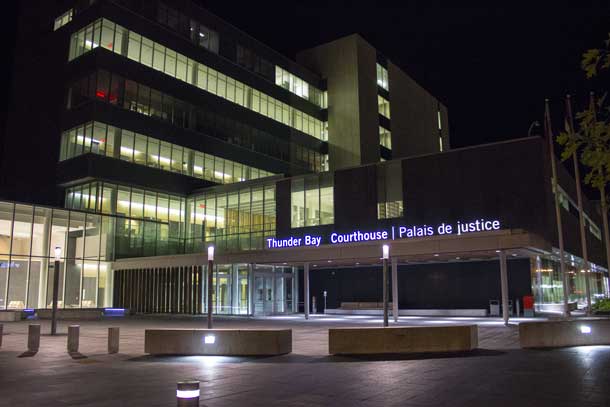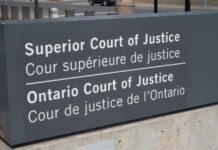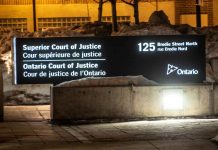TORONTO – Ontario Superior Court of Justice has suspended all regular operations effective Tuesday, March 17, 2020. The suspension will be until further notice.
The announcement by Geoffrey B. Morawetz, the Chief Justice of the Ontario Superior Court of Justice states that all criminal proceedings scheduled on or after Tuesday, March 17, 2020, have been adjourned.
The decision has been made to protect the health and safety of all court users and to help contain the spread of the 2019 novel coronavirus (COVID-19).
The Chief Justice Statement
All criminal, family and civil matters scheduled to be heard on or after Tuesday, March 17, 2020, are adjourned. This includes all telephone and videoconference appearances scheduled prior to March 17, 2020, unless the presiding judicial officer directs otherwise. Lawyers and litigants with matters scheduled on or after March 17, 2020, are advised not to attend the courthouse.
The Court will continue to hear urgent matters during this emergency period. The Court plays a fundamental role in our constitutional democracy. Access to justice for the most urgent matters must always remain available. This Notice identifies the urgent civil and family matters that shall be heard during the suspension of operations and the process for bringing such matters before the Court.
A separate Notice to the Profession and the Public will issue, governing criminal matters during the suspension of the Court’s regular operations.
In the weeks ahead, the Court will finalize a plan to resume regular operations. We anticipate the establishment of a Return to Operations (RO) Scheduling Court, where matters that have been adjourned will be rescheduled. We will strongly encourage counsel and parties to consent to future hearing dates. Should an appearance before the RO Scheduling Court be required, matters will likely be heard by teleconference.
For regular filings, that are not urgent as defined below, the Ministry of the Attorney General advises that courthouses will remain open. Those filings may continue to occur at courthouses. However, where procedural rules or court orders require the regular filing of documents during this emergency period, and it becomes impossible to file at the courthouse or the courthouse is believed to be unsafe, parties can expect the Court to grant extensions of time once the Court’s normal operations resume. Parties must still comply with orders/rules requiring the service or delivery of documents as between parties.
In the event, courthouses become closed or are inaccessible due to safety concerns, and to preserve limitation periods under the Limitations Act, parties should file Claims or Statements of Claims through the Small Claims Court online filing service, or the Civil Claims Online Portal for Superior Court civil matters. Limited family proceedings can also be filed electronically through the Ministry of the Attorney General’s website for filing divorce applications.
During this temporary suspension of regular operations, the Court calls upon the cooperation of counsel and parties to engage in every effort to resolve matters.
A. MATTERS TO BE HEARD DURING THE SUSPENSION
Until further notice, only the following urgent and emergency civil and family matters listed below shall be heard by the Superior Court of Justice.
- The following matters related to PUBLIC HEALTH AND SAFETY and COVID-19:
-
- applications by the Chief Medical Officer of Health for orders in relation to COVID-19;
- applications to restrain the contravention or continued contravention of an order made under the Health Protection and Promotion Act;
- applications to enforce orders requiring the seizure of premises, medications or supplies under the Health Protection and Promotion Act;
- appeals under subsection 35(16) of the Health Protection and Promotion Act;
- urgent requests for injunctions related to COVID-19; and
- urgent Divisional Court appeals and requests for judicial review related to COVID-19.
- The following FAMILY AND CHILD PROTECTION matters:
Only urgent family law events as determined by the presiding justice or events that are required to be heard by statute will be heard during this emergency period, including:
-
- requests for urgent relief relating to the safety of a child or parent (e.g., a restraining order, other restrictions on contact between the parties or a party and a child, or exclusive possession of the home);
- urgent issues that must be determined relating to the well-being of a child including essential medical decisions or issues relating to the wrongful removal or retention of a child;
- dire issues regarding the parties’ financial circumstances including for example the need for a non-depletion order;
- in a child protection case, all urgent or statutorily mandated events including the initial hearing after a child has been brought to a place of safety, and any other urgent motions or hearings.
- The following CIVIL and COMMERCIAL LIST (Toronto) matters:
-
- urgent and time-sensitive motions and applications in civil and commercial list matters, where immediate and significant financial repercussions may result if there is no judicial hearing.
- Outstanding warrants issued in relation to a Small Claims Court or Superior Court civil proceeding.
- Any other matter that the Court deems necessary and appropriate to hear on an urgent basis. The Bar and the public are advised that these matters will be strictly limited.
The Court has the discretion to decline to schedule for immediate hearing any particular matter described in the above list, if appropriate.
A hearing may be conducted in writing, by teleconference or videoconference, unless the Court determines that an in-person hearing is necessary. If an in-person hearing is needed, coordination will occur between the Ministry of the Attorney General, the trial coordinator, and the parties/counsel to find a safe and appropriate physical facility for the hearing.
B. PROCEDURE TO BRING AN URGENT MATTER
Filing urgent documents
- Moving parties/applicants shall file urgent motion and application materials by email to the appropriate courthouse. The list of email addresses for each court may be found here [By Tuesday March 17, 2020, a complete list of email addresses for urgent filings for each courthouse will be linked here].
- The Court expects parties will only submit brief materials to allow for a fair, timely and summary disposition. Emailed filings cannot exceed 10MB. If the size of electronically filed material exceeds 10MB, further emails may be sent within the 10MB maximum. Every effort must be made, however, to limit filed materials to 10MB.
- Unless a matter is proceeding ex parte (i.e. without notice to responding parties), filed materials must indicate when and how service on responding parties was made.
- Filed materials should also include any prior orders or endorsements that were issued and that are relevant to the urgent matter.
- Caselaw and other source materials referenced in factum should be hyperlinked. Where hyperlinks are provided, it will not be necessary to file a Book of Authority.
- Where it is not possible to email a sworn affidavit, affidavits may be delivered unsworn but the affiant must be able to participate in any telephone or videoconference hearing to swear or affirm the affidavit.
Scheduling a hearing
- Where a moving party/applicant has filed material to seek an urgent hearing, the trial coordinator will seek direction from a triage judge as to whether or not the matter is urgent and should be scheduled for a hearing. The triage judge will also determine a schedule for the service and filing of any responding material.
- Responding material shall be filed in the same manner as a moving party/applicant. The trial coordinator will provide to the parties the triage judge’s schedule for the service and filing of any responding material.
- Once all written submissions have been received, the judge will determine the manner of hearing.
- Matters may be heard and determined in writing, by telephone or video conference.
- It is anticipated that most matters will be dealt with by telephone conference, although a judge may direct a videoconference hearing. In rare instances, and where necessary and safe, some matters may be heard in-person in facilities that are deemed safe with necessary precautions in place.
- The trial coordinator will advise the parties/counsel of the date and time for the hearing, and the method of hearing. There will be strict limits for the duration of the hearing, and the trial coordinator will advise of the maximum allotted time for the hearing.
- There will be dedicated telephone conference lines for urgent hearings. There is also limited capacity for videoconference hearings. If one or more parties in a matter is represented by counsel, counsel may be asked to provide a teleconference number for the hearing.
The Hearing
- Where a telephone or videoconference hearing is scheduled, there will be strict time limits imposed for oral submissions, to which parties and counsel are expected to adhere.
- Mechanisms will be in place to record a hearing. Counsel and parties may also record a proceeding for their own purposes if authorized by the judge, pursuant to section 136(3) of the Courts of Justice Act.
C. SELF-REPRESENTED LITIGANTS
- Self-represented litigants are expected to comply with the process set out in this Notice.
- Pro Bono Ontario has a hotline (1-855-255-7256) for self-represented litigants with civil matters where they may obtain advice and assistance from dedicated pro bono lawyers.
- For family litigants, the Court seeks the assistance from the family bar and Legal Aid Ontario in providing necessary support.
D. CONCLUSION
This suspension will cause substantial inconvenience to those with matters before the Court. The decision to engage this emergency process was not made lightly. However, the health and safety of the public, as well as all justice participants is a priority.
We ask for and appreciate your co-operation, flexibility and understanding during this extraordinary time.
Geoffrey B. Morawetz
Chief Justice
Ontario Superior Court of Justice
To protect the health and safety of all court users and to help contain the spread of the 2019 novel coronavirus (COVID-19), the Superior Court of Justice (SCJ) is suspending all regular operations, effective Tuesday, March 17, 2020, and until further notice.
By order of Chief Justice Morawetz, for any accused person who has a criminal matter scheduled for any type of appearance in the Superior Court of Justice between March 17, 2020 and June 2, 2020, that matter is adjourned, unless directed otherwise by the Court. To preserve jurisdiction, for all accused persons who have been scheduled to appear between March 17, 2020 and June 1, 2020 a bench warrant with discretion will issue as of the date the person is scheduled to appear, pursuant to s. 597 (4) of the Criminal Code.
Accordingly, accused persons with matters scheduled in the Superior Court of Justice in the month of March, 2020:
- are adjourned until June 2, 2020
- must appear in court on June 2, 2020 at 10:00 a.m. at the court location at which they were to appear in March, 2020.
- a bench warrant with discretion is issued to return on June 2, 2020, and
- if the person fails to appear on June 2, 2020, a warrant will be issued for their arrest.
Accused persons with matters scheduled in the Superior Court of Justice in the month of April, 2020:
- are adjourned until June 3, 2020
- must appear in court on June 3, 2020 at 10:00 a.m. at the court location at which they were to appear in April, 2020.
- a bench warrant with discretion is issued to return on June 3, 2020, and
- if the person fails to appear on June 3, 2020, a warrant will be issued for their arrest.
Accused persons with matters scheduled in the Superior Court of Justice in the month of May, 2020:
- are adjourned until June 4, 2020
- must appear in court on June 4, 2020 at 10:00 a.m. at the court location at which they were to appear in May, 2020.
- a bench warrant with discretion is issued to return on June 4, 2020, and
- if the person fails to appear on June 4, 2020, a warrant will be issued for their arrest.
A. URGENT CRIMINAL MATTERS DURING THE SUSPENSION
The Court will continue to hear urgent matters during this emergency period. The Court plays a fundamental role in our constitutional democracy. Access to justice for the most urgent matters is available. This Notice identifies the urgent criminal matters that will be heard during the suspension of operations, and the process for bringing such matters before the Court.
- Judicial Pretrials
- Any counsel requiring a judicial pretrial on an urgent in-custody matter that has been affected by this adjournment should make arrangements with the Crown and make a request through the trial coordinator
- A list of trial coordinators’ contact information can be accessed here
- Judicial pretrials will be handled by phone
- Crown and defence counsel will be required to file matters electronically with the trial coordinator
- The court requests the cooperation of Crown and defence in assisting to provide the court with the necessary material during off-site operations
- All judicial pretrials scheduled prior to March 17, 2020 are adjourned, unless the presiding judicial officer directs otherwise. These matters may be rescheduled in the upcoming weeks and will be conducted by phone.
- Trials
- All trials are adjourned, unless ordered otherwise
- Accused persons, witnesses and counsel involved in jury trials that are in progress will receive direction from the presiding judge on March 16, 2020
- Witnesses, Lawyers and Jurors
Witnesses, lawyers and jurors should not attend court for trials or any matters between March 17 and May 29, 2020, unless specifically ordered to do so by the presiding judge. Jurors and witnesses will be re-notified of when to attend. Unless ordered otherwise, ongoing trials will be adjourned to a date after June 1, 2020.
- Bail, Bail Reviews and Detention Reviews
Bail, Bail Reviews and Detention Reviews will be available remotely. The court will utilize to the fullest extent Criminal Code provisions permitting matters to be heard in the absence of the accused, or in the presence of the accused by way of audioconference or, if available, videoconference. Parties are urged to provide consent to the use of these alternative processes to the fullest extent possible, where such consent is required.
Defence and Crown counsel should work together to arrange a date and the filing of materials through the trial coordinator.
- Self- represented persons
Assistance to self-represented persons may be available through a roster of volunteers from the criminal defence bar.
- Sureties
Defence counsel will be responsible for arranging to confirm sureties’ identification and to assist them to sign bail by signing an electronic bail release and scanning it back to the court registrar to be forwarded to the institution.
- Guilty Pleas and Sentencing
Guilty pleas and sentencing can be dealt with remotely for persons in custody in urgent circumstances.
Counsel should book a judicial pretrial to make arrangements.
- Resumption of Normal Operations
In the weeks ahead, the Court will finalize a plan to resume regular operations. Criminal matters are scheduled to return in the first week in June. However, if circumstances change and normal operations can resume earlier, the court will notify counsel, the Crown and institutions.
B. REGULAR FILINGS
For regular filings, that are not urgent as defined in this memo, the Ministry of the Attorney General advises that courthouses will remain open. Those filings may continue to occur. However, where procedural rules or court orders require the filing of documents during this emergency period and it becomes impossible to file at the courthouse or is believed to be unsafe, parties can expect the Court to grant extensions of time once the Court’s normal operations resume.
During this temporary suspension of regular operations, the Court calls upon the cooperation of Crown and defence to engage in every effort to cooperate with each other and to provide assistance to the Court in an effort to deal with urgent matters.
Geoffrey B. Morawetz
Chief Justice
Ontario Superior Court of Justice





